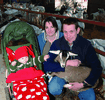400 reasons why goats are good for business

Gary Yeomans is in expansionist mood. However, it’s not cows but goats that are on the up and up at Pant Farm, Llanvetherine near Abergavenny. In fact, they gave him his first step on the farming ladder in 2001.
At the time he could not find the money to establish a 100-cow herd, which was his long-held ambition. He had come from a small family dairy farm and studied high-output milk production as part of a Nuffield scholarship, but the cost of buying cows and quota was too great.
An opportunity came when a local food company began offering contracts to suppliers of goat milk to make soft cheese, and there were no EU production quotas to worry about. Gary knew nothing about dairy goats, but be reckoned he could apply his husbandry and management skills to keeping any class of stock on the 40ha (100-acre) unit that his grandfather farmed until his death.
However his father, who is still a conventional Monmouthshire milk producer, was very sceptical about goats and remains so, even though the herd is successful and has quadrupled in size to 400 head.
“I had to take a lot of generally good-natured ribbing from friends and family when I decided to buy my first 100 goatlings. For a while some people even called me Gary Goatman, but I was determined to show that I could develop a profitable commercial enterprise.
“At the time most people saw goat-keeping as a hobby activity. Attitudes have changed and demand for goats’ milk is now growing by about 25% a year.
“When I look at the current state of the dairy industry I think I made the right decision. It is now very unlikely that I would ever consider going back to dairy cows.”
Controlling feed costs is very important, as the goats are kept in all year round to stop them destroying hedgerows.
Money has also been invested in doubling the size of the light and well-ventilated goat house, and he intends to install 20 extra milking points in the parlour.
Award-winning
Two years in the chair of Future Farmers of Wales, the organisation for award-winning LANTRA trainees, gave him a taste for farming politics. But, with a farm to run and a young family, ambitions in this direction are firmly on the back burner.
When British Grassland Society members visit the farm during their 2007 summer tour they will hear that gradual herd expansion is likely to continue, using home-bred animals.
This will exacerbate the problem of what to do with the male kids. Gary has struck deals with some farm parks, but there is no real market for male dairy kids, so many end up at the local hunt kennels, where he was once the Master.
Gary and his wife Jess, who combines goat kid rearing with being a part-time farm assurance inspector, now struggle to find time to ride to hounds.
“But we are doing all we can to support the pack until the ban is repealed. The kennels are doing a lot to help farmers cope with the fallen stock rules.”
When his business is fully established, he may consider processing and bottling some liquid milk for customers who are allergic to cow’s milk. There is also the possibility of involvement in farming politics, representing those who now have to accept that he is a first class stockman and land manager, despite making a living from Saanen and Togenberg goats rather than cows.
Gary, Jess and young Tom Yeomans with one of the 400 dairy goats.
GARY YEOMANS |
|
Back to Faces of the Future
